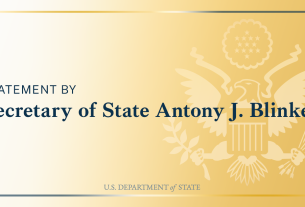Russia is grappling with the aftermath of a massive fuel oil spill in the Kerch Strait, a critical maritime passage between the Russian-occupied Crimea Peninsula and mainland Russia. The spill, which occurred more than two weeks ago following storm damage to two tankers, has led to severe environmental consequences, prompting widespread volunteer efforts to mitigate the damage.
According to local reports, more than 10,000 volunteers have been mobilized in the region to rescue wildlife and remove vast quantities of oil-soaked sand from the affected coastline. The spill resulted from two separate incidents: one tanker ran aground on December 24, and another was left damaged and adrift earlier that month. The Russian government declared a regional emergency last week as the oil continued to wash ashore.
Russian President Vladimir Putin referred to the incident as an “ecological disaster,” acknowledging the extent of the damage. The Ministry of Emergency Situations reported that over 71,000 tons of contaminated sand and soil had been cleared from 56 kilometers of coastline as of Wednesday, with estimates suggesting that up to 200,000 tons of materials may be contaminated in total.
Despite the massive response from local volunteers, there are growing concerns about the adequacy of government support. Some volunteers have criticized the state for not providing sufficient resources, including protective equipment and measures to protect workers from toxic fumes. Several volunteers reported experiencing health issues, such as headaches and nausea, after prolonged exposure to the contaminated environment. Some have even called for international expertise to address the scale of the disaster.
The spill has also had a devastating impact on wildlife, with reports of seabirds coated in thick oil and fears that more than 20 dolphins may have died due to the contamination. The Delfa dolphin rescue center in Crimea is currently investigating the cause of these deaths. Images circulating on social media show the extent of the devastation, with wildlife visibly affected by the toxic spill.
The Kerch Strait, which plays a crucial role in global shipping by connecting the Sea of Azov to the Black Sea, has been a focal point of geopolitical tension since Russia annexed Crimea in 2014. The area has seen ongoing conflicts between Russia and Ukraine, and the environmental disaster adds to the region’s long-standing challenges. In response to the spill, Mykhailo Podolyak, an advisor to Ukrainian President Volodymyr Zelenskyy, condemned the incident as a “large-scale environmental disaster” and called for further sanctions against Russian tankers.
The ongoing environmental damage from the spill underscores the broader risks of maritime accidents and the significant challenges of addressing such crises. As cleanup efforts continue, the scale of the impact on local ecosystems remains uncertain, and the Russian government’s handling of the situation will be closely scrutinized in the coming weeks.
Picture by vecstock on Freepik



